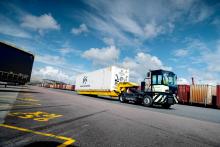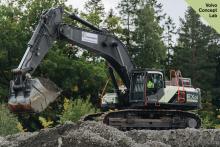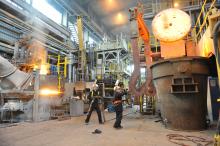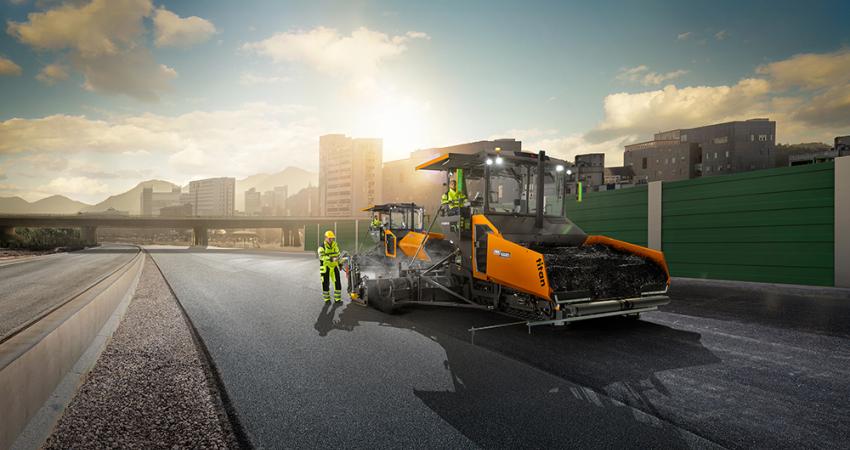The construction industry can lower its carbon emissions by taking advantage of technology advances in three areas – electro-mobility, intelligent machines and connected machines, said David Ross, vp of advanced technology and verification, Volvo Construction Equipment, who spoke at a seminar on climate challenges in infrastructure projects at bauma that the company hosted. With buildings contributing 30% to global emissions across their life cycle including construction and demolition, the industry needs t

Martin Weissburg, president of Volvo CE
The construction industry can lower its carbon emissions by taking advantage of technology advances in three areas – electro-mobility, intelligent machines and connected machines, said David Ross, vp of advanced technology and verification, 7659 Volvo Construction Equipment, who spoke at a seminar on climate challenges in infrastructure projects at bauma that the company hosted. With buildings contributing 30% to global emissions across their life cycle including construction and demolition, the industry needs to change if the world is to meets its climate change targets.
Shifting to electric motors powered by renewable energy will have a significant impact on the emissions of construction machinery. Building more intelligence into machines and connecting them will allow for more analysis and control of operations, leading to improved efficiency of operations, as well as reduced downtime through predictive analytics, said Ross.
Volvo is working with Skanska, the Swedish Energy Agency, and two universities on a pilot project to demonstrate these concepts applied to a quarry site. This electric, intelligent and connected site could achieve 95% reduction in carbon emissions and 25% reduction in total cost of ownership of quarrying operations, said Ross. The cost reduction is the commercial incentive that will ultimately encourage the industry to move in this direction, although there is likely to be an extended transition period, acknowledged Ross.
The industry is also being pushed towards taking carbon emissions and sustainability more seriously by a number of major public and private infrastructure projects across Europe. The UK's new HS2 high-speed railway project has sustainability at the heart of its design and implementation, said Mark Fenton, climate change specialist (carbon) at High Speed Two, the organisation managing the project who also spoke at the seminar. The project is using four 'key enablers' to drive down carbon emissions, Fenton said. The first enabler is leadership and governance, with carbon considerations integrated into all decision-making. Carbon emissions awareness will be raised through the culture and communications of the project. Suppliers will be challenged to come up with innovations and will have to meet rigorous sustainability standards. Procurement is the fourth enabler with the project's policy requiring suppliers to demonstrate carbon reduction in their activities and as well as meeting performance targets through the development, he said.
All videos
Shifting to electric motors powered by renewable energy will have a significant impact on the emissions of construction machinery. Building more intelligence into machines and connecting them will allow for more analysis and control of operations, leading to improved efficiency of operations, as well as reduced downtime through predictive analytics, said Ross.
Volvo is working with Skanska, the Swedish Energy Agency, and two universities on a pilot project to demonstrate these concepts applied to a quarry site. This electric, intelligent and connected site could achieve 95% reduction in carbon emissions and 25% reduction in total cost of ownership of quarrying operations, said Ross. The cost reduction is the commercial incentive that will ultimately encourage the industry to move in this direction, although there is likely to be an extended transition period, acknowledged Ross.
The industry is also being pushed towards taking carbon emissions and sustainability more seriously by a number of major public and private infrastructure projects across Europe. The UK's new HS2 high-speed railway project has sustainability at the heart of its design and implementation, said Mark Fenton, climate change specialist (carbon) at High Speed Two, the organisation managing the project who also spoke at the seminar. The project is using four 'key enablers' to drive down carbon emissions, Fenton said. The first enabler is leadership and governance, with carbon considerations integrated into all decision-making. Carbon emissions awareness will be raised through the culture and communications of the project. Suppliers will be challenged to come up with innovations and will have to meet rigorous sustainability standards. Procurement is the fourth enabler with the project's policy requiring suppliers to demonstrate carbon reduction in their activities and as well as meeting performance targets through the development, he said.
All videos









